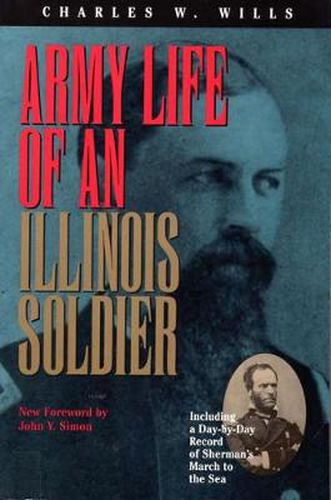Readings Newsletter
Become a Readings Member to make your shopping experience even easier.
Sign in or sign up for free!
You’re not far away from qualifying for FREE standard shipping within Australia
You’ve qualified for FREE standard shipping within Australia
The cart is loading…






A high-spirited idealist who craved excitement when he enlisted in the Eighth Illinois Volunteers for three months and reenlisted for three years, Charles W. Wills of Canton, Illinois, wrote frequently to his sister Mary Emily Wills and kept a diary of General William T. Sherman’s campaigns during the last year of the war. In the beginning of his service, Wills could boast that his company refused to enlist roughs. He reported that he and his comrades drink no liquors and keep ourselves as cleanly as possible…. Almost all are reading or writing, and I defy anyone to find 75 men without any restraint, paying more attention to the Sabbath… . Health generally excellent in our company, because we are all careful.
A student and store clerk before enlisting, Wills found that army life beats clerking. He enlisted as a private at the age of twenty-one and by twenty-four was a major. He had thought he might receive an infantry commission eventually, but when the opportunity arose for promotion to first lieutenant in the Seventh Illinois Cavalry, cupidity and ambition caused him to abandon the Eighth, enabling him to hold rank without so much walking. For a while, though, he seriously rued his lack of action. Haven’t I a brilliant record, he wrote. Thirty-three months in service and not a battle. As Simon points out, however, in the year ahead, Wills would have more than his fill of battles. Battle starved once, his enthusiasm for carnage waned as he marched with Sherman to the sea. Yet Major Wills was impressed by his troops’ endurance, spirit and recklessness.
Wills matured in the army. He joined solely to preserve the Union, and his early comments on slaves lacked sympathy, even decency, according to Simon. Later he came to the point where he would arm blacks– in part, with an eye toward gaining rank by leading the new regiments. Yet he was not blind to the anomalies of a slave society.
Wills died in 1883. To preserve his memory, his sister (now Mary Kellogg) printed his diary in 1904. Two years later, Kellogg combined the diary with the letters Wills had written to her earlier in the war. Simon renders this assessment: Wills had a sparkling, witty style that contrasted sharply with that of both his contemporaries in the field and the seven regimental veterans who compiled their diaries. In assembling this book, Mary E. Kellogg wisely allowed her brother to speak for himself; rarely intruding a comment of her own, excising from his letters home inevitable expressions of concern for his sister and her welfare but leaving intact the sparkling flow of camp gossip and military speculation.
$9.00 standard shipping within Australia
FREE standard shipping within Australia for orders over $100.00
Express & International shipping calculated at checkout
A high-spirited idealist who craved excitement when he enlisted in the Eighth Illinois Volunteers for three months and reenlisted for three years, Charles W. Wills of Canton, Illinois, wrote frequently to his sister Mary Emily Wills and kept a diary of General William T. Sherman’s campaigns during the last year of the war. In the beginning of his service, Wills could boast that his company refused to enlist roughs. He reported that he and his comrades drink no liquors and keep ourselves as cleanly as possible…. Almost all are reading or writing, and I defy anyone to find 75 men without any restraint, paying more attention to the Sabbath… . Health generally excellent in our company, because we are all careful.
A student and store clerk before enlisting, Wills found that army life beats clerking. He enlisted as a private at the age of twenty-one and by twenty-four was a major. He had thought he might receive an infantry commission eventually, but when the opportunity arose for promotion to first lieutenant in the Seventh Illinois Cavalry, cupidity and ambition caused him to abandon the Eighth, enabling him to hold rank without so much walking. For a while, though, he seriously rued his lack of action. Haven’t I a brilliant record, he wrote. Thirty-three months in service and not a battle. As Simon points out, however, in the year ahead, Wills would have more than his fill of battles. Battle starved once, his enthusiasm for carnage waned as he marched with Sherman to the sea. Yet Major Wills was impressed by his troops’ endurance, spirit and recklessness.
Wills matured in the army. He joined solely to preserve the Union, and his early comments on slaves lacked sympathy, even decency, according to Simon. Later he came to the point where he would arm blacks– in part, with an eye toward gaining rank by leading the new regiments. Yet he was not blind to the anomalies of a slave society.
Wills died in 1883. To preserve his memory, his sister (now Mary Kellogg) printed his diary in 1904. Two years later, Kellogg combined the diary with the letters Wills had written to her earlier in the war. Simon renders this assessment: Wills had a sparkling, witty style that contrasted sharply with that of both his contemporaries in the field and the seven regimental veterans who compiled their diaries. In assembling this book, Mary E. Kellogg wisely allowed her brother to speak for himself; rarely intruding a comment of her own, excising from his letters home inevitable expressions of concern for his sister and her welfare but leaving intact the sparkling flow of camp gossip and military speculation.